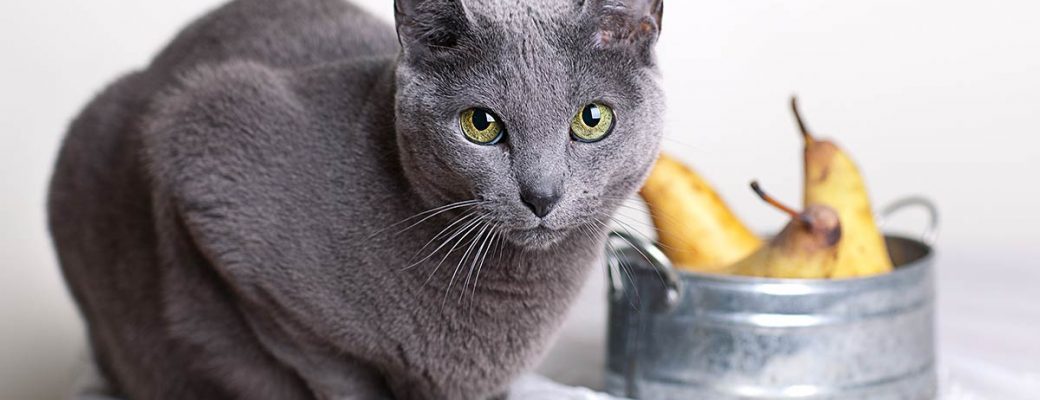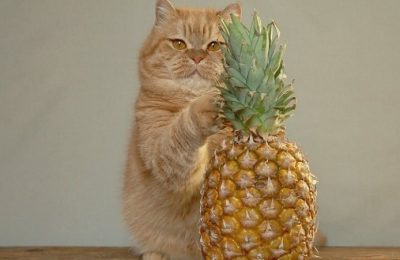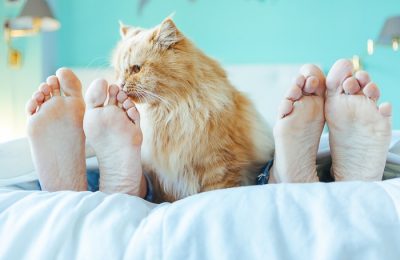Pineapples are one of the great-tasting fruits that are loaded with numerous essential ingredients. So, a…
Can Cats Eat Pears
Pears are mild sweet fruits that have a fibrous center. They are enriched with different types of antioxidants, plant compounds, and essential dietary fibers. The best part of the pears is that they are completely fat-free and doesn’t have cholesterol in them. That’s what makes the pears ideal for our health. Doctors also recommend eating pears. But what about the cats? Can cats eat pears, or are these harmful to them? You might have wanted to share the goodness of this nutritious food, but feeding anything unusual to the cats can really dangerous. So, before attempting to feed pears, you need to find out what role it will play in your cats’ bowels.
The unique bowel system of cats prevents them from eating many healthy foods. The foods with which we can be benefitted, cats can become ill with the same food. Like the onions, they belong to the allium family, right? They are nutritious and provides our health with numerous beneficial components. But do you know any food items from the allium family are completely prohibited for the cats? There are more like avocado, pizza, grapes, and more. That’s why you need to pay proper attention to the food items. Okay, now leave all these, and let’s see what will happen if your cat is ingested with the pears.
Can Cats Eat Pears?
I am not going to make things complicated and make you wait long. So, the answer to your question is yes; they can. Pears are non-toxic for the cats and won’t cause any harm to them if they are ingested.
The fleshy part of the pears contains a huge number of dietary fibers. This can fulfill the protein requirement of the cats. So, congratulations! You can share the goodness of the pears with your cat.
But wait! Before attempt to make something interesting with the pears, let me clear you something. It is true that the pears are safe and don’t contain any toxic elements, but too much intake of pears can cause harm to the cats.
You see, the digestive system of the cats are not actually designed for fruits and vegetables. They are designed for the meats instead. Where fruits and vegetables are safe and essential for us, it can be dangerous for cats. Cats are carnivores, and they live on the meats happily. They tend to obtain the nutritional facts from the meat and live healthy with that.
A small number of pears are safe, and they wouldn’t mind to digest them. But beware of the larger doses. If you give your cat or allow them to eat the pears at a large dose, it can lead your cat to the same issues. Using pears as an occasional snack will be ideal but make sure not to use them as a substitute for their original meal. If you do so, you may have to pay an early visit to your vet’s office.
Are Pears Safe for the Cats?
Honestly, the fleshy part is safe, but they have some essential fibers, but the pips and the seeds are poisonous for the cats. These are the items you should be aware of. Both of these contain cyanogenic glycosides that have a negative impact on the cat’s health. It affects the oxygen level, and if a cat consumes a considerable amount of this item, it can lead to death. You would probably not want to see that, right?
If you are feeding your cat a small flesh of the pear, make sure to extract the pips also.
Maybe you are unfamiliar with the name “Cyanogenic glycoside” and not agreeing with the terms I just explained. Okay, let’s make this clear. This poison has another name, and that’s cyanide. You have obviously heard it, aren’t you? This name is deadly as it heard. So, make sure not to give this poison by your own hand.
Pears aren’t the only food that contains cyanogenic glycoside. There are more foods that are listed here. Like the apples, peach, apricot, nectarine, the seeds of all of these foods contain this poison. A cat may not be able to eat a large seed but think about the apples. The seeds of the apple are small, and the cats can easily swallow them. You need to pay proper attention to this fact.
It is always better to be safe than sorry. That’s why extract the pip from the flesh of the pears before letting your cat having a bite of it. Even after your strict rule and proper attention, your cat manages to eat the pip; make sure to call your vet without wasting any time. They are the experts, and they will help you with a way to induce vomiting. It is better to take your cat directly to the vet, avoiding the inducing attempt at home. As you are not an expert, you can unlikely do something that you are not meant to do and worsen the case.
The bites of pears aren’t that harmful, but it can still harm your effect your feline friend’s digestive system. So, it is recommended to check their litter box and keep an eye on them. The initial symptom of something unusual can lead them to several dietary issues like diarrhea, vomiting, and more.
If you notice that your cat is facing diarrhea after continuing the pears intake, it will be better if you cut that out from their daily meal. You should be aware of the initial symptoms; otherwise, things can go wrong and affect your cat in the long run.
Conclusion
Can cats eat pears? Have you got your answer, or are you still confused? I have covered most of the essential things, and hopefully, you have understood them. Look, there are several cat foods that have all the essential things for the cats. If you are feeding your cat one of them, you really won’t have to depend on the pears or berries. Those foods are enough to deliver all nutritional facts.
https://youtu.be/nlO2pcd-Ygk




This Post Has 0 Comments